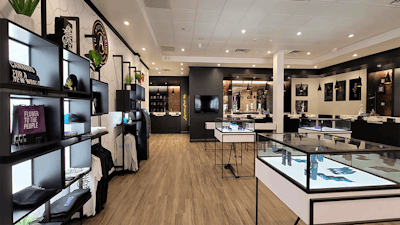
New Jersey’s approach to adult-use cannabis is nothing new: allow existing medical operators to fuel the takeoff as state regulators vet and approve aspiring market entrants.
And, so far, New Jersey’s supply chain and protections for its medical program—concerns that contributed to a two-month delay in launching adult-use sales—have remained unharmed as the legal market continues to grow, according to Columbia Care Vice President of Operations Volley Hayhurst and TerrAscend President and Chief Operating Officer Ziad Ghanem.

Columbia Care and TerrAscend—two of the largest publicly traded cannabis companies in the world—were among seven vertically integrated operators who were first to market when New Jersey commenced adult-use retail on April 21, 2022. They were the only two of those seven companies that were not fined by the state’s Cannabis Regulatory Commission (CRC) in connection to honoring patient-only hours during the first week of sales.
RELATED: 5 Cannabis MSOs Fined $360K in New Jersey; 2 Companies Respond
“In my opinion, at least from what we see in South Jersey, it’s very healthy,” Hayhurst said of where the state’s market stands as of the first quarter of 2023. “We have supply to be able to meet the demands, and not only obviously for the medical program, but also AU program. So, yeah, it’s strong and alive and healthy at this point, for sure.”
Columbia Care’s Cannabist dispensaries in Deptford and Vineland have served adult-use customers since day one. And despite the Deptford storefront representing one of two adult-use dispensaries within 5 miles of Philadelphia—a border-town boom for retail—the company has kept up with increased demand while preserving the integrity of its patient access plan, Hayhurst said.

In addition to medical-only hours, medical cannabis retailers have reserved parking spaces for patients, offer pre-adult-use prices and medical-only products for patients, and reserve point-of-sale stations for efficient service, among other program protections.
Although adult-use sales have led to greater foot traffic and demand, TerrAscend maintains an average of less than three minutes wait time for its patients, and the company hosts dedicated patient focused events, “so we really put our money where our mouth is,” Ghanem said.
The Supply Chain
That increased demand included more than $59 million per month in statewide retail sales in the third quarter of 2022, more than tripling what the medical market alone was recording in the first quarter. (The CRC had not released Q4 sales figures at the time this article was published).
On the supply side, New Jersey had 17 cultivation facilities with 418,000 square feet of operational canopy serving the total market as of January 2023, according to CRC. That’s roughly 4,500 square feet per 100,000 people.
By comparison, when California’s market supply was at peak saturation in mid-2022—at more than 80 million square feet statewide—licensed cultivators had an operational canopy of more than 200,000 square feet per 100,000 people, according to canopy estimates based on the state’s cultivation licensing data.
In Boonton, N.J., where TerrAscend has a 150,000-square-foot cultivation and processing facility, the company plans to dedicate roughly 95% of its capital expenditures toward completing its cultivation expansion projects there by the end of 2023, Ghanem said. Producing flower, prerolls, vapes, edibles, concentrates and other non-flower products, the Boonton facility supplies TerrAscend’s three Apothecarium dispensaries as well as the company’s receiving partners on the wholesale end of the business.

“We are very thoughtful on how we bring cultivation online,” Ghanem said. “We have a lot of learnings on how to bring in cultivation in stages in a way that we protect our demand versus supply and don’t ever go into an imbalance that will start to impact the operation, the margin, et cetera.”
By the end of 2023, TerrAscend will have the capabilities of nearly doubling its production capacity in New Jersey—compared to the beginning of the year—a strategic expansion that aligns with the anticipation of more nonvertical retail storefronts coming online as the year progresses.
Columbia Care’s Hayhurst said much of the same about the company’s 50,000- and 270,000-square-foot facilities in Vineland. The latter of the two opened in June to help serve the adult-use market and is in “phase one” of its buildout—additional phases are “scheduled to come online as the market sees fit,” Hayhurst said.
Adult-Use Market Impacts
When New Jersey’s market matures, statewide retail sales could average north of $150 million per month, much like Michigan—which has a similar population—experienced with its $2.3-billion market in 2022.
Still, during the first six months of adult-use legalization in New Jersey, the state’s market experienced diversification in product portfolios and in form factors, Ghanem said. As a pharmacist who “dealt with [the] opioids epidemic in other states and the challenges that that brings to the patient,” Ghanem said he believes cannabis is the best alternative for those patients.

While there often are concerns of a medical cannabis program’s degradation when adult-use sales come online, Ghanem said he’s confident—from both a data perspective and what he’s seen with a boots-on-the-ground presence—that product variety is becoming better, not worse, in New Jersey.
“Initially, when the market launched, flower made up more than 60 percent of sales in New Jersey overall in April [2022],” he said. “Now it’s a little bit less than 50 percent in the market because you saw vape and edible and concentrate and preroll SKUs entering the market.”
Specifically in August 2022, four months after the adult-use launch, flower made up just under 50% of monthly dollar sales in the state, according to BDSA, a retail sales data provider for the cannabis industry.
“Also, we saw new manufacturers and new brands entering the space,” Ghanem said. “The number of brands in the market has tripled since the launch, so it’s offering the customer in New Jersey more variety and is growing the knowledge of the New Jersey customer.”
Those brands will soon have additional homes. A limited-license state, New Jersey regulations cap individual businesses at three retail facilities—and the existing medical operators now serving both markets are nearly maxed out.
Open for Business
While 13 dispensaries were the first to serve adult-use customers in a state of more than 9 million people, that number grew to 22 dispensaries—operated by nine businesses—as of the first week of March 2023. That’s a ratio of one adult-use retailer per 400,000-plus people.

While legalization advocates and opponents alike often fear monopolization when a state provides larger companies first-mover advantage—especially when there are enormous amounts of money on the line—one benefit is a swift rollout of a regulated market, said Jennifer Cabrera, a New York-based partner at cannabis law firm Vicente LLP.
New Jersey and New York have taken drastically different approaches in that regard, with larger publicly traded cannabis companies barred from entering New York’s adult-use market until three years after the first retail sales began (Dec. 29, 2022) in an effort to allow individuals impacted by prohibition to enter the space and get established.
Two months after its adult-use sales launch, New York had four dispensaries open, including three nonprofits and one justice-involved licensee, to serve a state that’s populated by roughly 20 million people.
In her work with Vicente, Cabrera is familiar with both the New York and New Jersey markets.
“Allowing the MSOs to open their doors to adult-use makes a lot of sense, because our ultimate goal here is to get a regulated market in place,” she said.
The 14th state to launch a commercial adult-use program—among 19 to do so in the U.S.—New Jersey is a “fairly reasonable” place to do business as it relates to regulations that are clear, extensive and cover myriad ownership issues, Cabrera said.
“For companies that are looking into entering new markets, New Jersey is welcoming,” she said, adding that New Jersey is the most densely populated state in the nation. With roughly 1,300 residents per square mile, the Garden State ranks 11th in population and 46th by geographic area in the U.S., making it an attractive market for retailers.
Licensee Landscape
Also one of the most culturally diverse states in the U.S., New Jersey’s cannabis regulations aim to ensure that ownership of cannabis businesses is reflective of its population, Cabrera said. That means avoiding unreasonable restrictions on raising money or creating partnerships with out-of-state operators that know what they’re doing, she said.
“The legalization of cannabis from the black market to the regulated market does involve a change in the who is owning the operations and who’s actually operating it,” she said. “So, New Jersey wants to make sure that it is inclusive and doesn’t ignore a lot of the Black and Brown folks that were involved.”
During the CRC’s March 2 meeting, Executive Director Jeff Brown said that 72% of adult-use license applicants were from businesses that are diversely owned. Also, roughly 25% of aspiring market entrants qualify as social equity applicants. And 43% of the overall applicant pool intends to operate in one of the state’s impact zones—which include 87 of the state’s 565 municipalities.
Tahir Johnson fits the bill for all three categories. The third-generation native of Ewing Township, on the north side of Trenton, Johnson received CRC approval for his conditional retail license application in May 2022 and is now waiting on the state to approve his conversion to an annual license before becoming operational as a retail franchisee of Simply Pure.

To launch a retail business, Johnson is drawing on his professional experience as a financial adviser with Morgan Stanley and SunTrust Investment Services Inc. The 39-year-old entered the cannabis space as a budtender in 2019 and quickly gravitated toward advocacy, joining the National Cannabis Industry Association’s team later that year as the diversity, equity and inclusion manager. He went on to work in similar capacities for Marijuana Policy Project and the U.S. Cannabis Council in 2021. Most recently, Johnson was named to the Minority Cannabis Business Association’s 2023 board of directors.
RELATED: From Budtender to Dispensary Owner
“This idea of being able to take something that’s been a source of pain for my family and community, and be something that now we can attempt to create generational wealth—that’s the highlight of it all,” Johnson, who has a history of cannabis-related arrests, told Cannabis Business Times in February.
Johnson submitted his paperwork in December to convert his conditional license to an annual license—the final step of regulatory approval from the state before he becomes operational. He’s hopeful that conditional-to-annual conversion will come during the CRC’s next public meeting on April 13, he said.
The vast majority of the 940 adult-use retail license applications received by the CRC, as of Feb. 13, remain conditional, but more than 175 of those applicants have filed their conversion requests, Brown said during the regulatory body’s March 2 meeting.
“Most of those started to come in toward the end of last year, so those applications are moving through licensing, through investigations, and then eventually you’ll see those start to pop up on board agendas,” Brown said. “But we’re moving through them expeditiously.”
Suzan Nickelson, who was awarded a medical dispensary license in 2019, became the first Black women-owned cannabis operator in the state last month, when her dispensary, Holistic Solutions, passed all inspections and received final state approval to open. But New Jersey has yet for a Black- or Hispanic-owned business to begin participation in the adult-use market.
Pathway to New Partnerships
Johnson, who remains optimistic to be among the first, is one of hundreds of potential adult-use dispensary owners whom the state’s existing medical operators are hoping to do business with moving forward.
At Columbia Care, Hayhurst said he was receiving two to three requests per week in early 2023 from people who either won a new license or are pursuing a license and are inquiring about setting up wholesale agreements, meet and greets, tours, or simply to discuss sustainable partnerships as multistate operators and independent operators move forward together.
“As we move into 2023, the landscape starts to shift a little bit with a lot of the new, small licenses that are coming online,” Hayhurst said. “As they start to be awarded, whether it’s a social equity license or whether it’s a 2019 license winner that’s just now getting the doors open, there’s going be a lot of opportunity for not only the MSOs, but for the MSOs to be able to provide a lot of service and a lot of supply and a lot of help and guidance to these new licenses that are opening up and in the next chapter of their life.”
In 2019, the CRC opened a “request for application” round for additional medical cannabis licenses. After legal challenges, state regulators awarded those licenses in late 2021, and many awardees are just now opening their doors—including seven medical-only dispensaries that became operational between the CRC’s February and March meetings.
While 67.1% of New Jersey voters cast ballots in favor of adult-use legalization in 2020—a record-high figure among states that have legalized through the election process in the U.S.—local municipalities retained home rule over opting in or out of participating in the market or certain segments of the market, whether that be retail, cultivation or manufacturing.
In addition, towns and cities that opt in for New Jersey’s adult-use program maintain control over licensing caps and a competitive licensing process in their jurisdictions, Cabrera said. That local control is perhaps the biggest barrier to New Jersey’s market, she said.
“If you want a license in New Jersey, not only are you looking at your state application, but also the local application, and that’s expensive,” she said. “It often involves hiring a local lobbyist and working with towns.”
The resulting impact? A very large chunk of New Jersey’s market remains untapped in the present, as new licensees navigate their entrances. But as those licensees do start to come online, Ghanem and Hayhurst said they will continue to build relationships with new operators.
At Columbia Care, which has wholesale agreements with every fellow MSO in the state, Hayhurst said, the company prides itself on menu selection and has a goal to partner will forthcoming nonvertical licensees who may bring a “crafty style” SKU not yet on the market.
“It’s a win-win for the industry and for the state,” he said. “Our philosophy is a rising tide raises all ships. So, we’re in it together, especially with the small guys as well.”


























